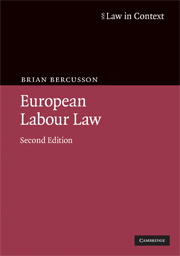Book contents
- Frontmatter
- Contents
- Preface
- Section I Labour law and Europe
- Section II The structure of European labour law
- 8 The institutional architecture of the European social model
- 9 A framework of principles and fundamental rights for European collective labour law
- 10 A framework of principles and fundamental rights for European individual employment law
- 11 The European Court of Justice, the EU Charter of Fundamental Rights and the European social model
- 12 General principles of enforcement of European labour law
- 13 Administrative enforcement of European labour law
- 14 Implementation and enforcement of European labour law and employment policy through the social partners at national and EU levels
- 15 Individual judicial enforcement of European labour law
- 16 Euro-litigation: collective judicial enforcement of European labour law
- 17 The European social dialogue: from dynamism to benign neglect 1993–2008
- 18 External and internal scrutiny of the democratic legitimacy of the European social dialogue
- 19 Threats and challenges to and the future of the European social dialogue
- Section III The futures of European labour law
- Index
- References
18 - External and internal scrutiny of the democratic legitimacy of the European social dialogue
from Section II - The structure of European labour law
Published online by Cambridge University Press: 05 June 2012
- Frontmatter
- Contents
- Preface
- Section I Labour law and Europe
- Section II The structure of European labour law
- 8 The institutional architecture of the European social model
- 9 A framework of principles and fundamental rights for European collective labour law
- 10 A framework of principles and fundamental rights for European individual employment law
- 11 The European Court of Justice, the EU Charter of Fundamental Rights and the European social model
- 12 General principles of enforcement of European labour law
- 13 Administrative enforcement of European labour law
- 14 Implementation and enforcement of European labour law and employment policy through the social partners at national and EU levels
- 15 Individual judicial enforcement of European labour law
- 16 Euro-litigation: collective judicial enforcement of European labour law
- 17 The European social dialogue: from dynamism to benign neglect 1993–2008
- 18 External and internal scrutiny of the democratic legitimacy of the European social dialogue
- 19 Threats and challenges to and the future of the European social dialogue
- Section III The futures of European labour law
- Index
- References
Summary
External review of the democratic legitimacy of the European social dialogue
The Maastricht Treaty on European Union transformed EC labour law by formally ‘constitutionalising’ the social dialogue in the Protocol and Agreement on Social Policy. Following the Treaty of Amsterdam of June 1997, and the UK's opt-in to the Social Policy Agreement, the role of the social dialogue in the making of EC labour law is formally enshrined in the EC Treaty.
At the very moment when the Amsterdam Treaty was incorporating the social dialogue process into the EC Treaty, there was litigation pending before the Court of First Instance (CFI) which challenged the first product of that process: the Parental Leave Directive and annexed Agreement. In a decision almost exactly one year after the Amsterdam Summit, the CFI delivered a judgment which highlights the constitutional nature of the integration of social dialogue into the EC Treaty. The judgment raises profound issues of the democratic legitimacy of EC labour law and legislation, the autonomy of the social partners engaged in social dialogue, and the role of litigation as a control mechanism of this legitimacy and autonomy.
The UEAPME case is a potential landmark in the history of European labour law. It concerns a choice between competing legal conceptualisations of the EU social dialogue. Put simply, EC labour law can be defined, described and developed in concepts derived from the constitutional law of the EC, or in concepts drawn from labour law traditions of the Member States.
- Type
- Chapter
- Information
- European Labour Law , pp. 563 - 606Publisher: Cambridge University PressPrint publication year: 2009



